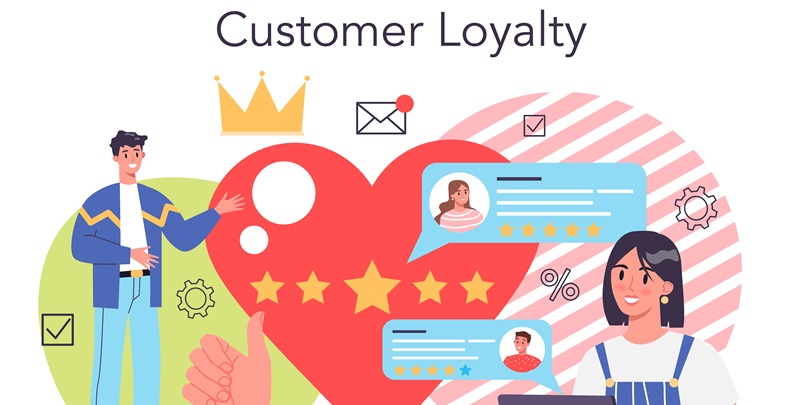In today’s highly competitive business landscape, customer loyalty plays a crucial role in the success and sustainability of any organization. It is not enough to simply attract customers; retaining them and fostering loyalty is equally, if not more, important. The key to building strong customer loyalty lies in having the right philosophy and effective communication strategies. This article explores the concept of the customer loyalty flywheel effect and how companies can achieve it through philosophy, communication, convenience, problem-solving, individualization, emotion activation, and community building.
Customer Loyalty Flywheel Effect
The customer loyalty flywheel effect is a concept that revolves around creating a self-reinforcing cycle of customer loyalty. It is not enough to focus solely on individual customer interactions; instead, companies must adopt a holistic approach that incorporates philosophy and actions. When companies have the right philosophy and communicate it effectively through their actions, a virtuous cycle of customer loyalty begins. Positive customer experiences lead to customer satisfaction, which in turn leads to word-of-mouth referrals and repeat business. This creates a powerful flywheel effect that propels customer loyalty forward, benefiting the company in the long run.
Creating convenience for customers
In today’s fast-paced world, convenience has become a significant factor in shaping customer loyalty. Customers value businesses that make their lives easier and more efficient. To prioritize convenience, companies must analyze their customer touchpoints and simplify processes. This can include streamlining the purchasing process, offering hassle-free returns, providing multiple channels for customer interaction, and investing in user-friendly digital platforms. By creating convenience for their customers, businesses can enhance customer loyalty and differentiate themselves from competitors.
Clear and transparent communication
A vital aspect of building customer loyalty is establishing clear and transparent communication channels. Customers appreciate honesty, integrity, and openness from companies with whom they interact. By effectively communicating product information, policies, and any changes, companies can build trust and foster customer loyalty. Clear and transparent communication creates a sense of transparency, ensuring that customers are well-informed and feel valued. Companies can achieve this through various channels, such as social media, newsletters, email updates, and proactive customer support.
Problem-solving and trust-building
One of the most impactful ways to gain and maintain customer loyalty is through effective problem-solving. Customers face issues at various stages of their journey, and how companies address those problems can have a significant impact on loyalty. By actively listening to customer concerns, addressing issues promptly and empathetically, and going above and beyond to resolve problems, companies can build trust and loyalty. It is important to accept any inconveniences or discomforts, recognizing that solving customer problems is an investment in long-term customer satisfaction and loyalty.
Individualized approach to customer loyalty
Treating each customer as an individual segment is a powerful strategy for building customer loyalty. Personalization goes beyond addressing customers by their names; it involves analyzing customer data to understand individual preferences, needs, and behaviors. By leveraging data analytics and technology, companies can create personalized experiences that make customers feel valued and understood. This can range from personalized marketing messages tailored to specific customer segments to customized loyalty programs that offer unique benefits based on individual preferences.
Emotional activation for customer loyalty
Positive emotions play a vital role in building customer loyalty. Customers are more likely to remain loyal to a company that evokes positive emotions during their interactions. To nurture positive emotions, companies must focus on creating memorable experiences, fostering emotional connections, and going the extra mile to exceed customer expectations. This can include personalized thank-you messages, surprise gifts, exclusive offers, and timely follow-ups. By integrating emotions into customer interactions, companies can activate the customer loyalty flywheel, further propelling loyalty and advocacy.
Building a community of enthusiastic customers
Building a community of enthusiastic customers is a powerful way to strengthen customer loyalty. Customers who feel a sense of belonging to a community of like-minded individuals are more likely to remain loyal to a brand and advocate for it. Companies can develop customer communities by offering exclusive forums, social media groups, events, and other platforms for customers to connect, share experiences, and provide feedback. By fostering a community, businesses can tap into the power of peer-to-peer recommendations and create a loyal customer base that acts as brand ambassadors.
In today’s competitive business environment, customer loyalty is paramount. By adopting the right philosophy, communicating effectively, prioritizing convenience, solving problems proactively, personalizing experiences, nurturing positive emotions, and building customer communities, companies can achieve the customer loyalty flywheel effect. This self-reinforcing cycle of loyalty leads to sustainable growth, improved customer retention, and a flourishing brand reputation. Investing in customer loyalty is an investment in the long-term success of any business.

